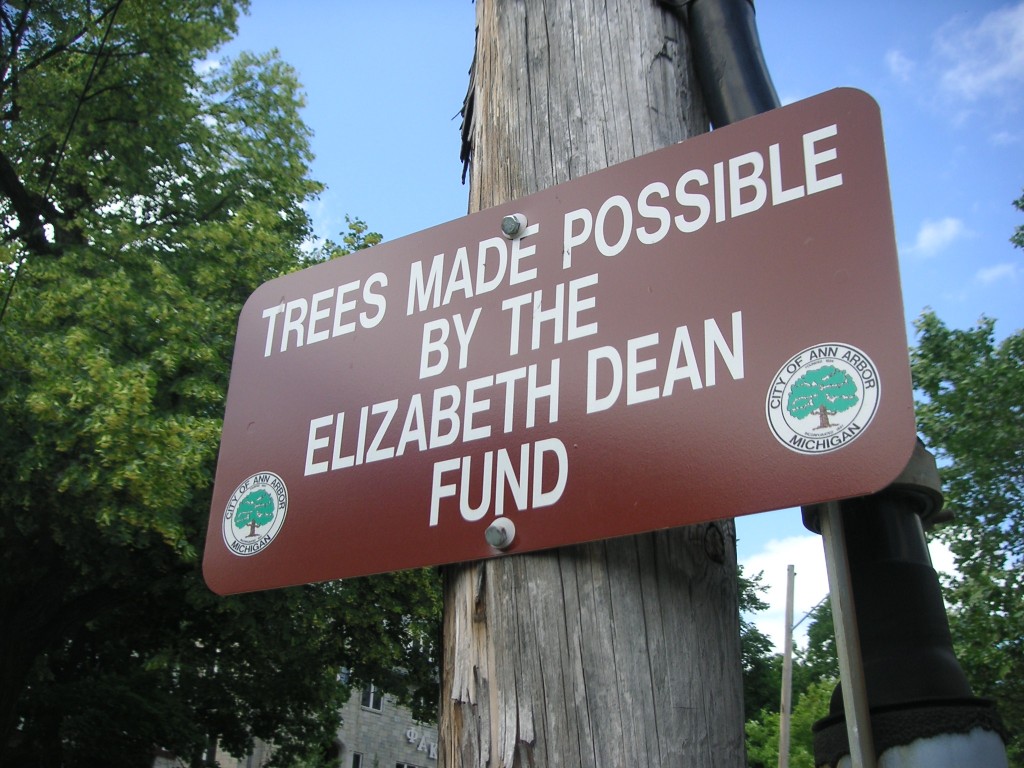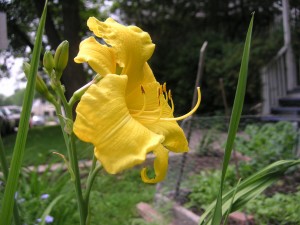This sign is just vague enough to make me laugh. Elizabeth Dean, bless her heart, gave some money to the City of Ann Arbor, and trees became possible! Which trees? All trees? TREES!
Tag Archive: rachel
The Small Infinity
By Rachel Chadderdon and Emily Plews
Delivered as a commencement address to the University of Michigan’s School of Natural Resources and Environment graduating class of 2010
May 1, 2010
Faculty, friends, families, and my fellow students,
In the years that we’ve been in graduate school, our world has seen some incredible changes. We have witnessed an international summit addressing climate change, the award of a Nobel Prize to the woman who demystified the tragedy of the commons, and the historic election of a man who believes in science to the office of President of the United States. But we’ve also seen atmospheric carbon dioxide reach the dangerous level of 390 parts per million, global economic recession, and several terrifying and saddening disasters in the process of mining fossil fuels.
We’ve been in school this whole time, learning (we presume) how to save the world. But the enormity of the challenges we face in our climate, culture, and economy can be overwhelming. So today, as we leave the theoretical safety of SNRE, I want to offer some simple words from someone who writes many words that I like – Michael Pollan. (NO, I don’t mean “eat food, not too much, mostly plants†– though that’s good advice, too). But equally simply, in a NY Times Op-ed from October of 2008 entitled “Why Bother?â€, Pollan stated, “Sometimes you have to act as if acting will make a difference, even when you can’t prove that it will.â€Â I like to remember these words when uncertainty overwhelms me, and when the unmeasurable challenges of how to create a sustainable society or even just how to define the word “sustainableâ€, seems like too much of a wicked problem to handle.
“Sometimes you have to act as if acting will make a difference, even when you can’t prove that it will.â€
We graduate today with the best possible skill sets for acting in the face of these unknowables:Â We can model incredibly complex systems with elegant mathematics, calculating eigenvalues and eigenvectors to describe and manage populations of wild species (these words will forever remain in my memory though their meanings may not).
We can carefully map the equally complex relationships and forces that surround policy decisions, so that we might have the best chance at progress.
We know how to use the tools of economics for good, not evil. And we know how to measure and manipulate human behavior to turn ourselves and our fellow citizens into better stewards of the planet.
We can compare the environmental impacts of different products in a standardized way using life cycle analysis, and GIS helps us concretely visualize our changing environment. We can conduct research, write papers in groups (this is a skill not to be underestimated); we are SMART enough to develop projects with Specific, Measurable, Achievable, Realistic, and Timely objectives, and we know and understand exactly why there is scientific consensus that anthropogenic climate change is happening.
But the truth is, we still don’t know that much. We don’t know how human activity truly affects the planet and we don’t know how to most effectively change our course. We don’t know which wedge of carbon reduction will succeed or fail, what will keep the Asian carp out of the Great Lakes, what will rectify the imbalance of access to resources between rich and poor. We don’t know what will stop deforestation and overfishing and factory farming and urban sprawl and bottled water – or, if anything will.  No policy works exactly how it’s supposed to; no behavior change strategy works on everyone. Stochastic events occur; politicians go rogue; uncertainty abounds… and we have to admit, with all our skills and knowledge, we just don’t know what will work.
So sometimes, we have to act as if acting will make a difference, even when we can’t prove that it will.
I know that some of us are bound for greatness in our actions, in careers thinking of the big picture solutions for our whole planet. We’ll help our leaders draft the treaties, laws, and programs that we need to protect our common resources – or we’ll become those leaders. We’ll build the corporations that lift up, not oppress, the poorest among us, while conserving, not wasting, our soil, water, and air. But we hear this all the time.  We’re graduating from Michigan, we’re the Leaders and the Best!  We count nonprofit and industry leaders among our alumni; our dean shares a Nobel Prize; the President flew in this morning just to tell us congratulations!  We have all the examples we need of greatness.
So I guess what I want to say to all of you, and to myself, is… think smaller. Even a leader is just one person. Robert Kennedy once said that “Few will have the greatness to bend history itself, each of us can work to change a small portion of events, and in the total of all those acts will be written the history of this generation.â€
That’s really it; our world is the sum of all of our actions.  So be great.  Run for office or launch the next Google, take your passion and your expertise and lead- the world needs it.
But at the same time, don’t underestimate the power of small experiments and the importance of everyday actions.  So teach children, ride your bike, pull garlic mustard, get off the grid, support your local everything.  You never know who might hear, and listen, and follow.  Engage in your community; participate in your democracy. Be nice. Most importantly, seek out and support the words, ideas, and actions, no matter how small, of others who are headed in the same direction.  You know these images: I’m talking about the small infinity, the school of little fish facing down the shark, the power of a small group of committed people to change the world.  Every choice you make, every word you say, every bite you eat could be the one that makes all the difference.
So act. Â Make peace with the uncertainty and just act.
Act boldly.
Act carefully.
Act with courage and act with love.
If you do, no matter what you do, you will make a difference.  Collectively, WE will make a difference – and the “proof†of that will be everywhere.
In this uncertain world, I’m optimistic, because I know you, my fellow graduates, will be out there working with me. And because I know we have the support of family and friends, who we can’t thank enough for standing beside us, even when they don’t always know what we’re doing. We have the benefit of an education at one of the world’s best schools in natural resources, and the guidance of professors who, while at the top of their fields in research, truly make it a priority to teach their students well. So I know that we’re ready, equipped with the skills to assess the challenges we face and the tools to engineer the solutions we need, the pragmatism to know when to move on and when to press on, and the hope to face the uncertainty, be scared, and act anyway, knowing that our work is worth it.
Congratulations, friends. I can’t wait to see what you do.


